Emergency Dentistry – Wethersfield, CT
Immediate Care for Hurting Smiles
During a dental emergency, most people’s first instinct is to head to their local ER, where they will likely wait for hours before they are seen by someone with little to no dental training. Patients in need of immediate dental care should instead call Wethersfield Dental Group. We have the training and equipment to handle urgent dental issues that most ERs don’t. Additionally, we’ll be able to see you much, much faster. In fact, we’re often able to schedule same-day appointments for emergency patients!
Why Choose Wethersfield Dental Group for Emergency Dentistry?
- Same-day appointments for emergency patients
- Advanced technology leads to faster & more comfortable care
- Highly skilled & experienced team
How We Treat Dental Emergencies
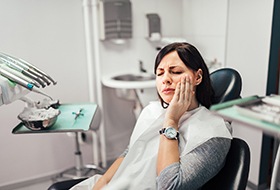
- Same-Day Appointment: We will try to see you on the same day as your call whenever we can. If you need first aid advice, our team will be happy to assist you over the phone.
- Emergency Examination: When you get to our office, we will capture X-rays and take a close look at your teeth so that we can figure out the nature of your emergency. We will also prioritize treating any severe pain that you’re currently experiencing.
- Review Findings: Upon completing our emergency examination, we will share our findings with you. We’ll explain what treatments can help as well as the costs involved; we want you to be able to make an informed decision about your care.
- Get the Care You Need: Drawing on her years of experience and utilizing the latest dental technology, Dr. Phadnis will take whatever steps are necessary to treat the root of your dental emergency.
The Most Common Dental Emergencies
Some emergencies are caused by sudden accidents or facial trauma while others might occur due to poor oral care. It’s important to be aware of the various kinds of dental situations that may warrant emergency treatment. Our team has dealt with all kinds of emergencies in the past; below are some particularly common examples that we’ve seen.
Understanding the Cost of Emergency Dentistry
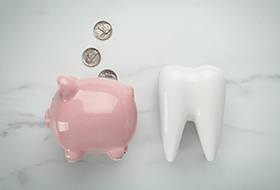
Some dental emergencies are more costly than others to treat. That said, you’ll only have an idea of how much you will need to pay for your emergency treatment once our team has taken a look at your mouth and gathered more information about your situation. In addition to giving you an estimate of how much your care will cost, we can also answer any questions you might have about dental insurance, financing, or our in-office dental plan.
Why Every Dental Emergency is Different

It’s common for patients to assume that there is a flat fee for emergency dental treatment. That’s not the case! In order to provide you with an estimate of the price, we need to consider things unique to your situation, including the type of dental injury and the necessary restorative care. Of course, there are other factors as well, like if you have dental insurance. We know navigating the cost can be overwhelming without help, which is why we’re always here to provide transparent prices, answer questions, and provide details on the financial solutions we offer.
Does Dental Insurance Cover Dental Emergencies?

Depending on your specific dental plan, your emergency exam may be completely covered or upwards of 80% of the cost of the necessary restorative care will be covered. It really depends on your plan and provider! The good news is that we welcome virtually all PPO insurance plans, including ones from popular providers like Delta Dental, MetLife, and Aetna. In other words, we can help you better understand your benefits, provide you with a breakdown of your out-of-pocket expenses, and even handle the paperwork so you don’t have to.
Other Options for Making Dental Emergencies Affordable

At Wethersfield Dental Group, we also offer financial solutions for patients who are uninsured, including:
- CareCredit: If you haven’t heard of CareCredit before, it’s a third-party financier that has helped millions and millions of patients over the years. All you have to do is pinpoint your monthly budget and find the payment plan that works for you – it’s really that simple. It’s also possible that the one you choose will have little-to-no interest attached!
- In-House Dental Plan: Our in-house dental plan offers the best of both worlds: significant savings and no red tape! More specifically, you get access to benefits like a covered emergency X-ray and exam without the waiting periods, annual deductibles, yearly maximums, and the like.
Here’s How Taking Care Of Your Smile Can Save You Money

Remember, many dental injuries can be avoided (even serious ones like a knocked-out tooth). That means that adopting healthy habits can benefit your smile and your wallet! In addition to wearing a mouthguard during sports and quitting unhealthy behaviors, like smoking, we recommend brushing and flossing consistently, getting a dental checkup and teeth cleaning twice a year, and keeping foods and drinks with added sugar to a minimum.
Keys to Preventing Dental Emergencies

The good news is that many dental emergencies – from a painful toothache to a completely knocked-out tooth – are avoidable. That’s why we encourage our patients to adopt healthy habits that will keep their teeth and gums healthy. If you’re not sure where to start, then this next section is for you. Below, you’ll find a few things that are key to preventing serious dental injuries.
Get a Dental Checkup and Cleaning Biannually

Simply put, your routine visits to our office dramatically increase the chances of us finding dental trouble before it results in sensitivity, soreness, and pain. That’s why it’s so important that you come in every six months for a checkup and cleaning – even if everything feels perfectly fine. Our goal is to conduct a comprehensive exam to ensure nothing is developing under the radar and also clear away plaque and tartar from your teeth and gums!
Maintain Good Oral Hygiene At Home

Remember, brushing alone isn’t enough. In addition to using a soft-bristled toothbrush and fluoridated toothpaste each morning and evening, you need to floss and rinse with an antimicrobial mouthwash consistently. The combination of these three oral hygiene best practices will dramatically reduce your chances of experiencing a painful toothache, bleeding gums, and other serious dental emergencies.
Don’t Overindulge on Added Sugar

Unfortunately, sugary foods and drinks can wreak havoc on the condition of your teeth and gums. That’s why we strongly recommend enjoying candy, soda, and other sweet treats in moderation. The majority of your diet should instead be vitamin-rich, nutrient-dense foods that will give your body the nutrients it needs to fight off infections.
Tip: Exercise caution with hard and crunchy foods to help prevent a chipped or cracked tooth!
Wear a Mouthguard
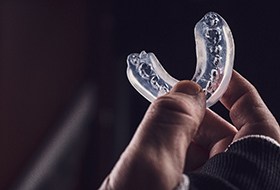
Sports-related accidents are one of the biggest causes of dental emergencies. That’s why it’s of the utmost importance that you wear a mouthguard whether you participate in a contact or non-contact sport! At Wethersfield Dental Group, we can have a custom one made to ensure that it fits well and provides your teeth and gums with the proper amount of protection.
Quit Unhealthy Dental Habits
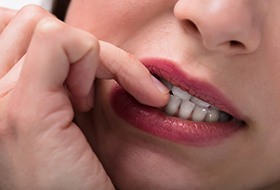
While smoking can wreak havoc on your gums, biting your nails can create cracks in your enamel. While using your teeth to remove a bottle cap can lead to a fracture, chewing on ice cubes can cause a tooth to split down the middle. In other words, you need to quit unhealthy dental habits if you want to dramatically reduce your chances of winding up in our emergency treatment chair.
Root Canals
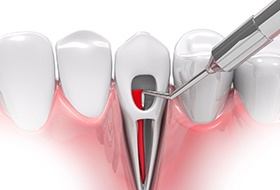
If a tooth is experiencing extreme pain or sensitivity, the culprit is likely an infection in the dental pulp, which is the inner layer of a tooth where the delicate nerve is located. In this kind of situation, a root canal is usually the best way to both stop the pain and save the tooth from extraction. For this procedure, Dr. Phadnis will:
- Remove the infected tissue from within the tooth
- Clean and disinfect the tooth
- Replace the tissue with a biocompatible filling material
- Reinforce the enamel with a dental restoration
Thanks to modern-day dental techniques such as dental sedation, this often-feared procedure is now no more painful than getting a small filling.
Tooth Extractions
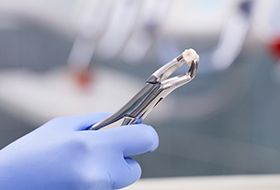
While our number one goal is to always preserve our patients’ natural teeth for as long as possible, extraction is the best path forward for the patient’s well-being in some situations, such as:
- A tooth is too decayed to be repaired with a filling or crown
- A tooth is so broken that it cannot be put back together
- Advanced gum disease has deteriorated the bone supporting a tooth
To ensure the comfort of our extraction patients, Dr. Phadnis always uses a light touch and plenty of local anesthetics. Sedation dentistry is also available upon request.
Learn More About Tooth Extractions
Wisdom Tooth Extractions
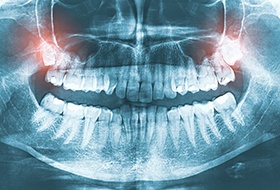
The wisdom teeth are a third set of molars that typically try to come in around the late teens or early twenties. The key word here is “try,” as most patients simply don’t have enough room in their mouth for these teeth, which is why they often cause pain, crowding, and even dangerous infections. We can stop and even prevent these problems by providing a safe and effective wisdom tooth extraction right here in Wethersfield, saving patients from having to visit an outside specialist.
Dental Emergency FAQs
Will My Toothache Go Away On its Own?
Typically, serious toothaches are a result of underlying oral health problems, like damage or infection, that won’t go away on their own. These problems need the assistance of a professional to be resolved and will not heal otherwise.
It’s worth noting that in the case of severe damage, the nerve tissue within the tooth may begin to die. If this happens, you’ll find that you no longer feel your toothache, though the underlying issue may still be present and worsening.
How Should I Sleep With Tooth Pain?
Even if you schedule an emergency appointment, there are some circumstances where you might have to try and sleep before seeing your dentist.
If you’re struggling to rest, you should try sleeping with your head elevated. This prevents blood from flowing to your teeth, which may bring down swelling and inflammation. You may also want to take over-the-counter pain medicine or make use of a cold compress to bring down any swelling.
Should I Visit the Emergency Room First for Dental Emergencies?
Dealing with toothaches and other dental emergencies requires specialized tools and expertise that the average ER does not possess. That being the case, they usually aren’t going to be able to handle issues with your teeth.
The only situations where you should head to the emergency room first are if your issue needs to be addressed immediately, like in the case of serious lacerations in the mouth, swelling that is blocking your airways, or if your jaw is broken.
What Does Throbbing Tooth Pain Mean?
Throbbing, consistent tooth pain could mean a few things, and you would need to see us in our office for us to tell you exactly what the issue is. However, in many circumstances, the issue is due to an infection or inflammation within the tooth. This is caused most often by advanced cavities or gum disease.
This kind of issue is typically dealt with via either a root canal or extraction, depending on the severity of the infection.
I Need a Dental Checkup & Cleaning I Have a Cavity or Broken Tooth I am Missing One or More Teeth I am Unhappy with My Smile View Our Services

